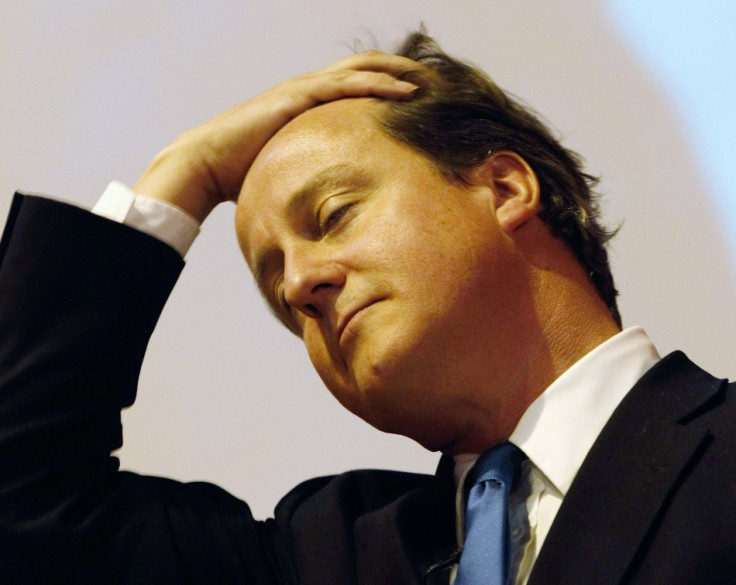Stuck in the Middle: David Cameron's Europe Dilemma [BLOG]
Both Eurosceptic backbenchers and members of the Labour party want positive results for Britain from the EU budget meeting in Brussels, says Alasdair Drennan

Talks to determine the EU's 2014-20 budget are due to commence. David Cameron is under significant pressure from both his own party, and the Opposition, to secure a cut in the UK's EU budget; last month he was defeated in the Commons by the Labour Party and 53 of his own backbench MPs who called for a real-terms cut in the EU budget.
At home, there is increasing dissatisfaction with the UK's EU membership. Polls showthat six out of 10 voters in Britain would be keen to see an exit from the EU unless powers could be returned home from Brussels and a budget cut (as opposed to a freeze or with inflation increase) could be secured. Similarly, the UK Independence Party (Ukip) is gaining in strength, threatening Mr Cameron's position.
The same survey for the Independent revealed that a quarter of Tory voters are considering voting Ukip at the next election - to lose these voters would be devastating for the Tories. In the recent Corby by-election, Ukip won a significant enough portion of the votes to take third place, pushing the Liberal Democrats to fourth. Whilst the next election is most probably a relatively distant prospect, unless Cameron takes decisive action now to win back Tory core voters, his popularity is only set to decline further.
Furthermore, in an interview with the Sunday Telegraph, Labour leader, Ed Miliband called on Mr Cameron to bring about EU reform at the summit. Although he is traditionally pro-Europe, Miliband admitted that he agreed with some of the Eurosceptics' grievances stating that the proposed budget was suitable for the 1950s as opposed to 2012.
In spite of the clear support at home for a budget cut, Mr Cameron remains in a difficult position. All 27 EU states must agree on a future budget and so the prime minister could use his veto to reject any budget increases.
However, if a budget agreement cannot be reached, the EU will revert to a "rolling budget" which would ultimately cost Britain more than at present. There is clearly not going to be a simple way to reconcile the growing Euroscepticism at home and the practicality that if an agreement cannot be reached, there will likely be a budget increase anyway.
Mr Cameron may not be alone in calling for a budget reduction, however. Sweden is also calling for a modernisation of the budget, and in 2010, Mr Cameron, German Chancellor Angela Merkel and nine other EU leaders signed a letter calling for a freeze or cut in the EU's budget.
Matters are further complicated by France's position under newly elected socialist president François Hollande, who has reacted angrily to the anticipated changes to the budget. The proposal would see the seven-year budget of €1,091 billion from cut by just €80 billion, less than half the €200 billion hoped for by the Britain.
The proposal advocates cuts in spending on agriculture to appease the British and Swedish, who have called for investment in areas which would be more likely to produce economic growth. Finding common ground between France, a country which gains significantly from the current EU agriculture spending, and Britain may simply prove impossible.
The EU costs the UK almost £6 billion each year, once the rebate has been paid and not once since 1979 has Britain received more back from the EU than it has spent. This is primarily due to the EU's historic focus on agriculture, which makes up only a small portion of the British economy. Information like this easily demonstrates the other, unquantifiable benefits being part of the European Single Market may bring.
Some perspective is necessary when determining the UK's financial contribution to the EU. Making up less than one per cent of the UK's total annual public spend, in reality, the raw cost of EU membership is a fairly moot point. The UK's banking bailout cost the Government just short of £124 billion in cash and a further £330 billion in guarantees.
The EU budget creates a massive dilemma for the prime minister. Europe itself is divided over its budget and finding a middle ground will prove very difficult. This is mixed with pressure at home not to return without a budget cut but also the knowledge that without reaching an agreement, the budget will be set to increase anyway.
It is important that the budget does not become the focus of discussions over EU membership. As a portion of the UK's total spending, the EU is minute. A debate over future membership of the EU should be based on what the UK actually receives or loses from its EU membership and should not be based on the budget alone. It would be better to widen the debate to take account of what the exact implications of EU membership are - especially in tough economic times. Is it safe to be connected to Portugal, Ireland, Italy, Greece and Spain and any other struggling economies?
Could the UK function better on the fringes of the EU in the same way that Norway and Switzerland operate?
In this moment in time, the debate over the budget is just a simplistic way for the Opposition to win further ground from the government.
Alasdair Drennan is the editor of The Student. He is studying history at the University of Edinburgh.
© Copyright IBTimes 2024. All rights reserved.





